2024年中考英语复习专题陈述句 的五个基本句型 课件(共83张PPT)
文档属性
| 名称 | 2024年中考英语复习专题陈述句 的五个基本句型 课件(共83张PPT) |

|
|
| 格式 | ppt | ||
| 文件大小 | 914.5KB | ||
| 资源类型 | 教案 | ||
| 版本资源 | 通用版 | ||
| 科目 | 英语 | ||
| 更新时间 | 2024-05-27 14:06:02 | ||
图片预览


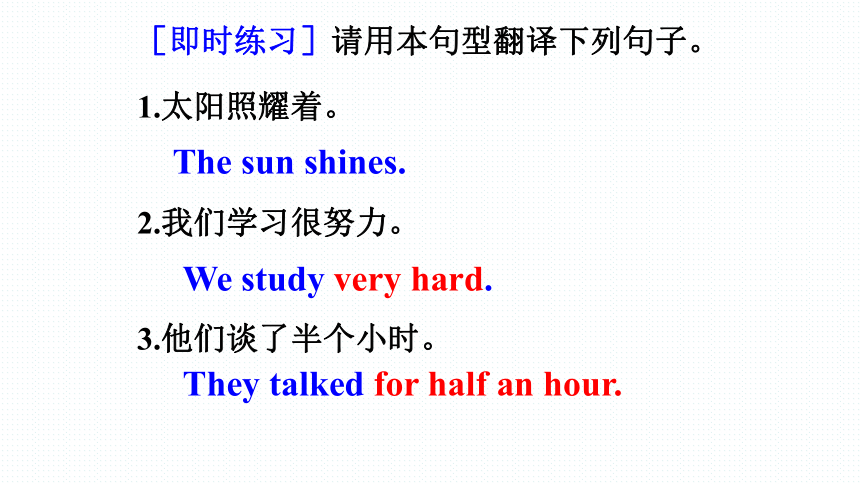
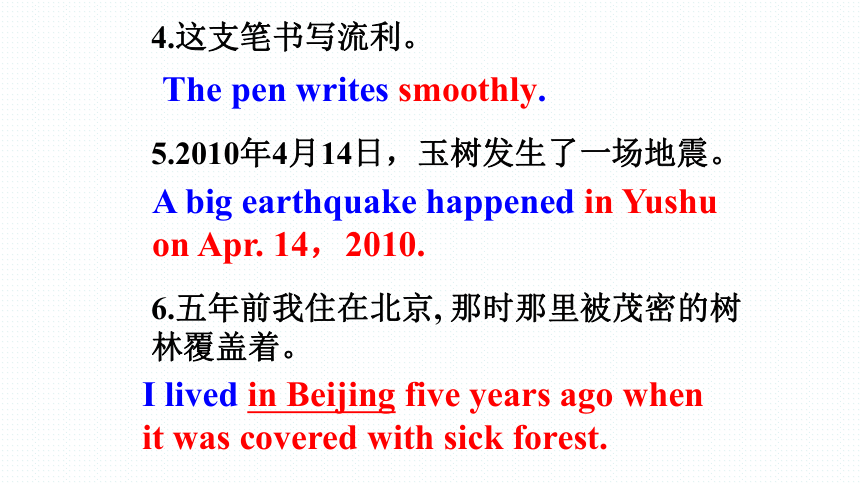


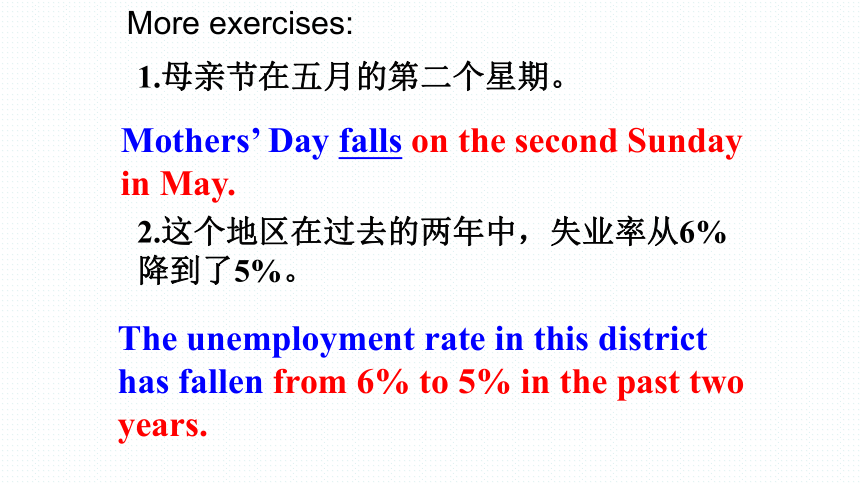
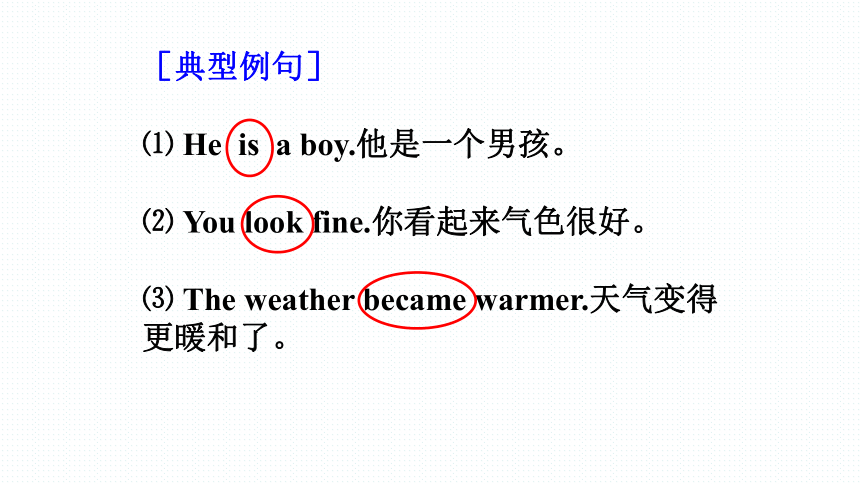
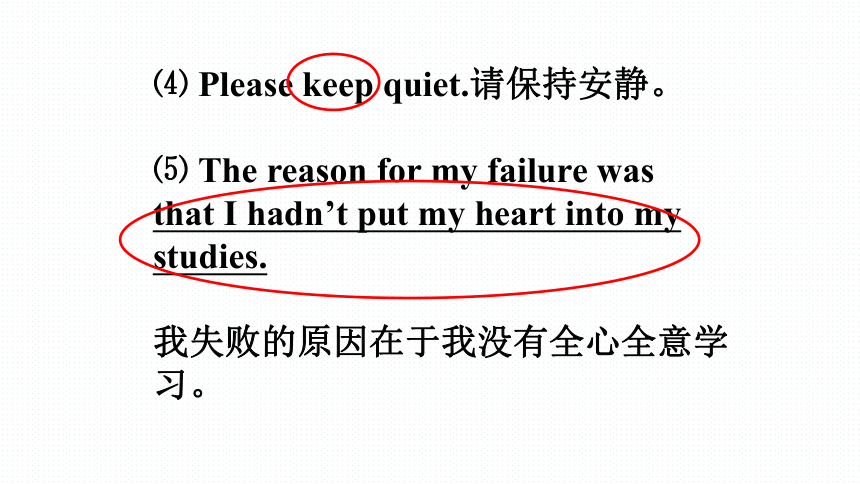


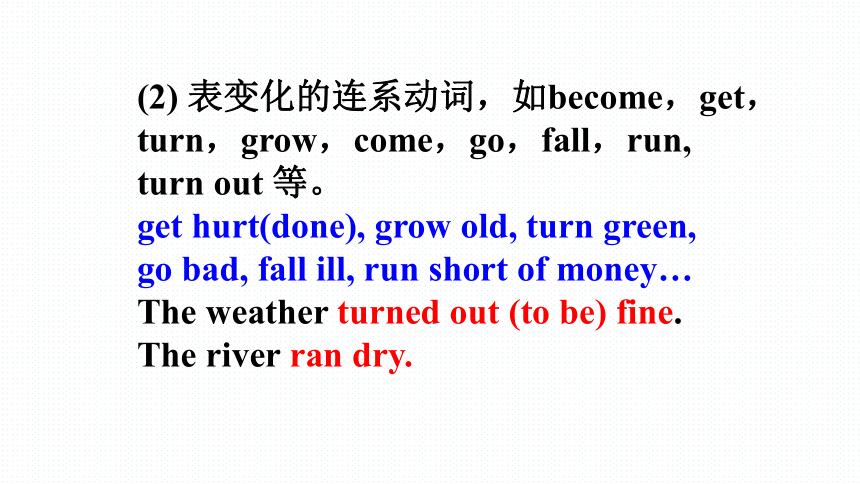
文档简介
(共83张PPT)
2024年中考英语复习专题★★
陈述句的五个基本句型
[即时练习]请用本句型翻译下列句子。
1.太阳照耀着。
2.我们学习很努力。
3.他们谈了半个小时。
The sun shines.
We study very hard.
They talked for half an hour.
4.这支笔书写流利。
5.2010年4月14日,玉树发生了一场地震。
6.五年前我住在北京, 那时那里被茂密的树林覆盖着。
The pen writes smoothly.
A big earthquake happened in Yushu on Apr. 14,2010.
I lived in Beijing five years ago when it was covered with sick forest.
7.他昨晚很晚回家。
8.在过去的十年里,我的家乡已经发生了巨大的变化。
Great changes have taken place in my
hometown in the past ten years.
He returned home late last night.
[特别说明]
本句型中,谓语动词都能表达完整的意思,这类动词叫做不及物动词,后面可以跟副词、不定式、介词短语、状语从句等作状语。
More exercises:
1.母亲节在五月的第二个星期。
2.这个地区在过去的两年中,失业率从6%降到了5%。
Mothers’ Day falls on the second Sunday
in May.
The unemployment rate in this district
has fallen from 6% to 5% in the past two
years.
[典型例句]
⑴ He is a boy.他是一个男孩。
⑵ You look fine.你看起来气色很好。
⑶ The weather became warmer.天气变得更暖和了。
⑷ Please keep quiet.请保持安静。
⑸ The reason for my failure was
that I hadn’t put my heart into my studies.
我失败的原因在于我没有全心全意学习。
该句型中,谓语动词不能表达一个完整的意思,必须加上一个表明主语身份或者状态的表语构成复合谓语,才能表达完整的意思,这类动词叫系动词。
[特别说明]
1.常用的系动词有:
⑴ be动词。
(2) 表变化的连系动词,如become,get,turn,grow,come,go,fall,run, turn out 等。
get hurt(done), grow old, turn green,
go bad, fall ill, run short of money…
The weather turned out (to be) fine.
The river ran dry.
(3) 表持续或处于(某种状态或情形)的连系动词,如remain,keep,stay,lie, stand, rest等
Snow was lying thick on the ground.
Knowing that she’s safely home,
I can rest easy (stop worrying).
The house stood empty for a long time.
(4)表示“……起来”的感官系动词,如sound(听起来),taste(尝起来),smell(闻起来),feel(摸起来),look(看起来),seem(似乎),appear(显得)等。
可加that/as if 引导的从句
It seems that they know what they are doing.
It seems as if they knew what they were doing.
[即时练习]请用本句型翻译下列句子。
1.这台机器的情况良好。
2.丝绸摸起来又软又滑。
3.他突然病倒了。
This machine is in good condition.
Silk feels soft and smooth.
He has suddenly fallen ill.
4.他静静地站着。
5.电梯坏了。
6.未来几天天气将持续寒冷。
He stood quite still.
The lift is out of order/has gone wrong.
It will stay/remain cold for several days.
7.那个男人被证明是个贼。
8.我希望你梦想成真。(come true)
The man proved (to be) a thief.
I hope your dream will come true.
9.那就是他居住的地方。(表语从句)
That is where he lives.
10. 他的任务是调查这个事件。
His job is to look into this matter.
11. 他喝醉了。
He got drunk.
2.作表语的典型词类是形容词、名词、介词短语、不定式短语、从句等也可以作表语。
More exercises:
11. All the passengers on board are asked to remain _______ (seat) as the plane was making a landing.
12. The new shirt ___________ (not feel) good.
seated
doesn’t feel
13. Having a trip abroad is certainly good for the old couple, but it remains____________ (see) whether they will enjoy it.
14.Peter被证明是一个非常有趣的导游。On the long journey,
_______________________________
to be seen
Peter proved to be a very interesting guide.
16.这个数字保持不变,说明阅读仍然是人们获得知识和信息的一种重要手段。
_______________________________ indicating that people acquire knowledge or find information.
The number stays nearly the same,
14.看起来似乎他憎恨被欺骗。
_______________________________
It appears that he hated to be cheated.
15.看样子天要下雪了。
_______________________________
It looks as if it is going to snow.
[典型例句]
Mary enjoys music.玛丽喜欢音乐。
He loves her.他爱她。
I want to get your help.我想得到您的帮助。
I don’t know what to do.
我不知道该怎么办。
He enjoys reading.
他喜欢阅读。
I don’t think he’s right.
我认为他不对。
[特别说明]
及物动词本身需要一个动作的接受者(宾语),才可以表达一个完整的意思。做宾语的可以是名词、代词、动名词、不定式、从句等。
1.常要求接不定式作宾语的动词有attempt,decide,desire,expect,hope,intend,learn,offer,pretend,promise,refuse,would like/love, afford, want, wish等。
I wish to speak to the manager.
2.可以接“疑问词+不定式”作宾语的动词有ask,consider,decide,explain,find out,forget,guess,know,learn,remember,tell,understand,wonder等。
3.常要求接动名词作宾语的动词有admit,appreciate, advise,avoid,ban, consider,delay,enjoy,excuse,finish,forbid,fancy, imagine,mind,miss,practice,postpone, risk,resist, suggest,give up,can’t help,look forward to, feel like, be used to, be accustomed to, have trouble/difficulty/a hard time (in) doing sth等。
I can’t face seeing them.
(不能)处理,对付 真不愿意见到…
Do you fancy going out this morning
Fancy meeting you here! 竟然
It is an unpopular decision to postpone building the new hospital.
The bank strongly resisted cutting interest rates.
He left off playing the piano to answer the door.
Please excuse my interrupting you.
4.接to do和doing意义不同的动词或短语有remember,forget,regret,stop,go on, mean, try等。
We regret to inform/tell you that your application has not been accepted.
He bitterly regretted having mentioned it.
He means to succeed.
Being late means losing the job.
5.表示“(某物)需要(做某事)”的动词need,want,require等,接doing的主动形式与接to be done意思相同。deserve
[即时练习]请用本句型翻译下列句子。
1.她用微笑表示感谢。
2.他拒绝帮他们的忙。
3.他承认犯了错误。
She expressed her thanks with a smile.
He refused to help them.
He admitted making a mistake/that he
had made a mistake.
4.我想喝杯茶。
5.这课室需要清洁了。
6.他不介意受到老师的责备。
I would like (to have) a cup of tea.
The classroom needs cleaning.
He didn’t mind being blamed by the
teacher.
7.医生已决定什么时候给病人做手术。
8.永远不要冒险违背自然的法则。
The doctor has decided when to
operate on the patient.
Never risk going against the law
of nature.
9.当妈妈进来的时候,Tom假装正在阅读。
10.我忘记帮你买那本书了。
I forget to buy that book for you.
Tom pretended to be reading when his
mother came in.
[典型例句]
⑴ Tom gave me a book.
汤姆给了我一本书。
⑵ He offered her a job.
他给她提供了一份工作。
⑶ My mother bought me a skirt.
妈妈给我买了条裙子。
⑷ My mother made me a dress.
我母亲给我做了件衣裳。
[特别说明]
该句型中的谓语动词必须跟两个宾语才能表达完整的意思。一个是表示人的间接宾语,一个表示物的直接宾语。间接宾语一般在前面,直接宾语在后面。若将直接宾语放到间接宾语前,一般要加上介词to或for,如上述四个例句可分别说成:
⑴ Tom gave a book to me.汤姆给了我一本书。
加 of 的动词:
cure, convince, inform, rob, rid , warn,
remind, accuse, persuade, cheat…
希望你们能把工作进展的情况告诉我们。
I hope you will inform us of how you are getting on with the work.
I hope you will keep us _________ of how you are getting on with the work.
informed
⑵ He offered a job to her.
他给她提供了一份工作。
⑶ My mother bought a skirt for me.
妈妈给我买了条裙子。
⑷ My mother made a dress for me.
我母亲给我做了件衣裳。
[即时练习]请用本句型翻译下列句子。
1.我想为父亲挑选一份合适的礼物。
2.母爱给予我们鼓励和力量。
I would like to choose a suitable present for my father.
Mother’s love gives us encouragement
and power.
3.我决定自学英语。
4.那个老人给我们指路。
5.请在本周末把所借的书都还给图书馆
I decided to teach myself English.
The old man showed us the way.
Please return all the books to the
library by this weekend.
6.为了你,我愿意做一切事情。
7.我们应警告孩子网络的危险。
8.Mary写了封信给Tom。
Mary wrote Tom a letter./
Tom wrote a letter to Tom.
I’ll do everything for you.
We should warn children of the dangers
online.
9. 医生治好了他的病。
10. Tom 使 Mary 相信了他的诚实。
The doctor has cured him of his disease.
Tom convinced Mary of his honesty.
本句型中的动词虽然是及物动词, 但是只跟宾语还不能表达完整的意思, 必须加上一个补充成分, 如形容词、名词、副词(仅限少数几个)、动词不定式、分词来补充说明宾语, 才能表达一个完整的意思。宾语和宾语补足语在意义有一种逻辑上的主谓关系, 即宾语与宾语补足语在“意义上”是一种主谓关系。如:
基本句型五: 主语+及物动词+宾语+宾补
We elected Li Yang our monitor.我们选李阳做我们的班长。
(Li yang is our monitor)
The news made us sad.这新闻使我伤心。
(We were sad)
根据宾补的不同可分为以下几种情况:
1.主语+及物动词+宾语+名词。
President appointed John manager of Marketing.
总裁任命约翰为营销部经理。
常用于此句型的动词有:call, name, make, elect, appoint, consider, leave等。
常用于此句型的动词有:make, paint, get (ready), cut (short), set (free), keep, drive (mad), find, wish, beat (black and blue), prove, think, believe, consider, leave等。
2. 主语+及物动词+宾语+形容词。如:
The news made me happy.
那消息使我很高兴。
3. 主语+及物动词+宾语+介词短语。如:
I found myself in dark. 我发现自己还蒙在鼓里。
要求用to do作宾补的动词有:advise, allow, ask, beg, cause, choose, encourage, expect, force, get, invite, order, permit, persuade, request, tell, want, warn, wish等。
4. 主语+及物动词+宾语+不定式。
如:
He encouraged her to work harder.
他鼓励他努力工作。
He always has others wait for him.他总是要别人等他。
要求用do作宾补的动词有:使役动词let, make,have等;感官动词observe, feel, hear, listen to, look at, notice, see, watch等。
若变为被动语态, 其后的宾语补足语就成为主语补足语了, 此时作主语补足语的不定式要带to。如:
The boss made him work overtime.(主动语态)
He was made to work overtime.(被动语态)老板叫他加班。
5.主语+及物动词+宾语+分词。如:
Don’t leave the water running after you have washed your hands.
洗手之后不要听任水白流。
I heard my name called.
我听到有人叫我的名字。
现在分词为宾语补足语时, 宾语与现在分词之间是主动关系; 过去分词为宾语补足语时, 宾语与过去分词之间是被动关系。常用于此句型的动词有:catch, find, get, have, keep, leave, feel, hear, listen to, look at, notice, observe, see, watch, smell 等。
6. 主语 + 谓语 + it + 宾补 + 真正宾语。
I found it very pleasant to be with your family.
(2) She thinks it no point practicing so much.
(3) He believed it unlikely that she would agree.
(1) 当作宾语的不定式、动名词、宾语从句跟一个补足语时, 要用形式宾语it放在宾语的位置, 将真正的宾语放到后面。
(2) 用doing作真正的宾语时, 其补足语通常是no use, no good, no sense, no point等, 表示“无益或没有意义”。
(3) 能用于该句型的谓语动词有consider, believe, feel, find, make, think, suppose等。
1. 那噪音快要使我发疯了。
1. The noise is driving me crazy.
即时练习:
3. 他请我们参加做游戏。
He asked us to join in the game.
4. 妈妈要我放弃一些课外活动。
Mother wants me to give up some after-class activities.
5. 明天我要找人来修理机器。
5. I will have the machine repaired tomorrow.
6. 每天早晨我们都听到他大声朗读英语。
6. We hear him reading English aloud every morning.
7. 父母必须让孩子做一些家务。
Parents should have children do some housework .
8. 他踢足球时摔断了腿。
He had his leg broken while playing football.
9. 我感到很难找到时间与父母交谈。
9. I feel it hard to find time to talk with my parents.
10. 我们要把保护环境看做是我们的职责。
10. We should consider it our duty to protect the environment.
11. 学校定了一条规则学生要穿校服。(make)
The schools made it a rule that students should wear uniform every school day.
12. 我认为只想不做是无益的。
I believe it no use thinking without acting.
[句型归纳]简单句共有以下五种基本句型:
句型 例句
主语+系动词+表语 The child seems healthy.
主语+不及物动词 We study hard.
主语+及物动词+宾语 Tom loves sports.
主语+及物动词+间接宾语+直接宾语 My father bought me a bike.
主语+及物动词+宾语+宾语
补足语 He painted the wall white.
[即时练习]
根据下列提示与要求用英语写一篇短文。
[写作内容]
请根据以下提示内容,介绍你班班长。
1.李明是我们班里的一名优秀学生。
2.他能够用英语流利地表达。
3.因为这些原因,我们选他做我们班的班长。
4.去年,他在我生日的时候送了我一份很漂亮的礼物。
5.现在,我们成为好朋友,这个暑假我将和他去旅游。
Li Ming is an excellent student in our class. Besides, he can express himself in English fluently. For these reasons, we chose/elected him monitor of our class. Last year, to my surprise, he gave me a nice gift on my birthday. Now we become good friends, and this summer he and I will go travelling together.
句型“There + be + 主语 +状语/定语(不定式、分词或从句)”,用以表达在某处或某时“存在”某人某物。其中,there 仅为引导词,并无实际意义
⑵ There are many students ________ (hold) an opposite view.有很多学生持相反意见。
⑶ There are trees _______ (plant) by students all over the mountain.
满山都是学生们种的树。
holding
planted
⑷ There is a book and two pens in the bags.
人称一致
⑸ 明天会有一个会议。
There will be a meeting tomorrow.
时态
⑹ 这个村庄曾经有一口井。
There used to be a well in the village.
⑺ 一定会有我可以做的工作。
There must be some job I could do.
⑻ 这个决定里很有可能存在着严重的错误。
There is likely to be a serious mistake in the decision.
⑼碰巧在这个学校中有我一个同学。
There happens to be a classmate of mine in this school.
(10) 学校附近有一座高大的建筑。(stand)
Near our school there stands a high building.
(11)从前在一个小镇上有一名好医生。
Once there lived a good doctor in a small town.
此句型有时不用be动词,而用 live,stand,come,go,lie,remain,exist,arrive, follow等不及物动词。
There followed an uncomfortable silence.
There ____ (be) no buses, I have to walk home.
There not ______ (be) a question mark to the sentence is wrong.
being
[即时练习]
一、单句翻译请用There be句型翻译下列句子。
1.二月份有二十八天。
2.下午将有大风。
There’re 28 days in February.
There’ll be strong winds in the afternoon.
3.灯亮着,办公室里一定有人。
4.战前这儿曾有家电影院的。
The lights are on. There must be
someone in the office.
There used to be a cinema here before
the war.
5.恰好那时房里没人。
6.从前,在海边的一个村子里住着一位老渔夫。
There happened to be no one in the
house.
Once upon a time,there lived an old
fisherman in a village by the sea.
7.山脚似乎有人在砍树。
8.有大约15%的学生认为学习成绩不重要。
There are about 15% of the students
thinking/who think that exam results
are not important.
There seems to be someone cutting
down trees at the foot of the mountain.
二、写作运用
根据下列提示与要求用英语写一篇短文。
[写作内容]
来自美国的Alice到你校考察,为了让他更好地了解你校的情况,你向他介绍你校的情况:
师生人数 六年前,我校总共只有500名师生,而现在有3000多个学生和300多位老师。
学生住宿情况 以前学生和教师在一栋教学楼住宿和上课学生们从星期一到星期五都住在学校宿舍,没有一个学生住校外。学生住在学校非常方便,因为宿舍周围就有一个大超市和三间士多店。随着越来越多的学生到我校就读,明年将会有一栋新的宿舍楼被建起来。
学校方面 然而,为了建设和谐校园,学校好像还有很多事情要准备。
[写作要求]
(1)只能使用5个句子表达全部内容;
(2)尽可能多使用there be 句型。
2024年中考英语复习专题★★
陈述句的五个基本句型
[即时练习]请用本句型翻译下列句子。
1.太阳照耀着。
2.我们学习很努力。
3.他们谈了半个小时。
The sun shines.
We study very hard.
They talked for half an hour.
4.这支笔书写流利。
5.2010年4月14日,玉树发生了一场地震。
6.五年前我住在北京, 那时那里被茂密的树林覆盖着。
The pen writes smoothly.
A big earthquake happened in Yushu on Apr. 14,2010.
I lived in Beijing five years ago when it was covered with sick forest.
7.他昨晚很晚回家。
8.在过去的十年里,我的家乡已经发生了巨大的变化。
Great changes have taken place in my
hometown in the past ten years.
He returned home late last night.
[特别说明]
本句型中,谓语动词都能表达完整的意思,这类动词叫做不及物动词,后面可以跟副词、不定式、介词短语、状语从句等作状语。
More exercises:
1.母亲节在五月的第二个星期。
2.这个地区在过去的两年中,失业率从6%降到了5%。
Mothers’ Day falls on the second Sunday
in May.
The unemployment rate in this district
has fallen from 6% to 5% in the past two
years.
[典型例句]
⑴ He is a boy.他是一个男孩。
⑵ You look fine.你看起来气色很好。
⑶ The weather became warmer.天气变得更暖和了。
⑷ Please keep quiet.请保持安静。
⑸ The reason for my failure was
that I hadn’t put my heart into my studies.
我失败的原因在于我没有全心全意学习。
该句型中,谓语动词不能表达一个完整的意思,必须加上一个表明主语身份或者状态的表语构成复合谓语,才能表达完整的意思,这类动词叫系动词。
[特别说明]
1.常用的系动词有:
⑴ be动词。
(2) 表变化的连系动词,如become,get,turn,grow,come,go,fall,run, turn out 等。
get hurt(done), grow old, turn green,
go bad, fall ill, run short of money…
The weather turned out (to be) fine.
The river ran dry.
(3) 表持续或处于(某种状态或情形)的连系动词,如remain,keep,stay,lie, stand, rest等
Snow was lying thick on the ground.
Knowing that she’s safely home,
I can rest easy (stop worrying).
The house stood empty for a long time.
(4)表示“……起来”的感官系动词,如sound(听起来),taste(尝起来),smell(闻起来),feel(摸起来),look(看起来),seem(似乎),appear(显得)等。
可加that/as if 引导的从句
It seems that they know what they are doing.
It seems as if they knew what they were doing.
[即时练习]请用本句型翻译下列句子。
1.这台机器的情况良好。
2.丝绸摸起来又软又滑。
3.他突然病倒了。
This machine is in good condition.
Silk feels soft and smooth.
He has suddenly fallen ill.
4.他静静地站着。
5.电梯坏了。
6.未来几天天气将持续寒冷。
He stood quite still.
The lift is out of order/has gone wrong.
It will stay/remain cold for several days.
7.那个男人被证明是个贼。
8.我希望你梦想成真。(come true)
The man proved (to be) a thief.
I hope your dream will come true.
9.那就是他居住的地方。(表语从句)
That is where he lives.
10. 他的任务是调查这个事件。
His job is to look into this matter.
11. 他喝醉了。
He got drunk.
2.作表语的典型词类是形容词、名词、介词短语、不定式短语、从句等也可以作表语。
More exercises:
11. All the passengers on board are asked to remain _______ (seat) as the plane was making a landing.
12. The new shirt ___________ (not feel) good.
seated
doesn’t feel
13. Having a trip abroad is certainly good for the old couple, but it remains____________ (see) whether they will enjoy it.
14.Peter被证明是一个非常有趣的导游。On the long journey,
_______________________________
to be seen
Peter proved to be a very interesting guide.
16.这个数字保持不变,说明阅读仍然是人们获得知识和信息的一种重要手段。
_______________________________ indicating that people acquire knowledge or find information.
The number stays nearly the same,
14.看起来似乎他憎恨被欺骗。
_______________________________
It appears that he hated to be cheated.
15.看样子天要下雪了。
_______________________________
It looks as if it is going to snow.
[典型例句]
Mary enjoys music.玛丽喜欢音乐。
He loves her.他爱她。
I want to get your help.我想得到您的帮助。
I don’t know what to do.
我不知道该怎么办。
He enjoys reading.
他喜欢阅读。
I don’t think he’s right.
我认为他不对。
[特别说明]
及物动词本身需要一个动作的接受者(宾语),才可以表达一个完整的意思。做宾语的可以是名词、代词、动名词、不定式、从句等。
1.常要求接不定式作宾语的动词有attempt,decide,desire,expect,hope,intend,learn,offer,pretend,promise,refuse,would like/love, afford, want, wish等。
I wish to speak to the manager.
2.可以接“疑问词+不定式”作宾语的动词有ask,consider,decide,explain,find out,forget,guess,know,learn,remember,tell,understand,wonder等。
3.常要求接动名词作宾语的动词有admit,appreciate, advise,avoid,ban, consider,delay,enjoy,excuse,finish,forbid,fancy, imagine,mind,miss,practice,postpone, risk,resist, suggest,give up,can’t help,look forward to, feel like, be used to, be accustomed to, have trouble/difficulty/a hard time (in) doing sth等。
I can’t face seeing them.
(不能)处理,对付 真不愿意见到…
Do you fancy going out this morning
Fancy meeting you here! 竟然
It is an unpopular decision to postpone building the new hospital.
The bank strongly resisted cutting interest rates.
He left off playing the piano to answer the door.
Please excuse my interrupting you.
4.接to do和doing意义不同的动词或短语有remember,forget,regret,stop,go on, mean, try等。
We regret to inform/tell you that your application has not been accepted.
He bitterly regretted having mentioned it.
He means to succeed.
Being late means losing the job.
5.表示“(某物)需要(做某事)”的动词need,want,require等,接doing的主动形式与接to be done意思相同。deserve
[即时练习]请用本句型翻译下列句子。
1.她用微笑表示感谢。
2.他拒绝帮他们的忙。
3.他承认犯了错误。
She expressed her thanks with a smile.
He refused to help them.
He admitted making a mistake/that he
had made a mistake.
4.我想喝杯茶。
5.这课室需要清洁了。
6.他不介意受到老师的责备。
I would like (to have) a cup of tea.
The classroom needs cleaning.
He didn’t mind being blamed by the
teacher.
7.医生已决定什么时候给病人做手术。
8.永远不要冒险违背自然的法则。
The doctor has decided when to
operate on the patient.
Never risk going against the law
of nature.
9.当妈妈进来的时候,Tom假装正在阅读。
10.我忘记帮你买那本书了。
I forget to buy that book for you.
Tom pretended to be reading when his
mother came in.
[典型例句]
⑴ Tom gave me a book.
汤姆给了我一本书。
⑵ He offered her a job.
他给她提供了一份工作。
⑶ My mother bought me a skirt.
妈妈给我买了条裙子。
⑷ My mother made me a dress.
我母亲给我做了件衣裳。
[特别说明]
该句型中的谓语动词必须跟两个宾语才能表达完整的意思。一个是表示人的间接宾语,一个表示物的直接宾语。间接宾语一般在前面,直接宾语在后面。若将直接宾语放到间接宾语前,一般要加上介词to或for,如上述四个例句可分别说成:
⑴ Tom gave a book to me.汤姆给了我一本书。
加 of 的动词:
cure, convince, inform, rob, rid , warn,
remind, accuse, persuade, cheat…
希望你们能把工作进展的情况告诉我们。
I hope you will inform us of how you are getting on with the work.
I hope you will keep us _________ of how you are getting on with the work.
informed
⑵ He offered a job to her.
他给她提供了一份工作。
⑶ My mother bought a skirt for me.
妈妈给我买了条裙子。
⑷ My mother made a dress for me.
我母亲给我做了件衣裳。
[即时练习]请用本句型翻译下列句子。
1.我想为父亲挑选一份合适的礼物。
2.母爱给予我们鼓励和力量。
I would like to choose a suitable present for my father.
Mother’s love gives us encouragement
and power.
3.我决定自学英语。
4.那个老人给我们指路。
5.请在本周末把所借的书都还给图书馆
I decided to teach myself English.
The old man showed us the way.
Please return all the books to the
library by this weekend.
6.为了你,我愿意做一切事情。
7.我们应警告孩子网络的危险。
8.Mary写了封信给Tom。
Mary wrote Tom a letter./
Tom wrote a letter to Tom.
I’ll do everything for you.
We should warn children of the dangers
online.
9. 医生治好了他的病。
10. Tom 使 Mary 相信了他的诚实。
The doctor has cured him of his disease.
Tom convinced Mary of his honesty.
本句型中的动词虽然是及物动词, 但是只跟宾语还不能表达完整的意思, 必须加上一个补充成分, 如形容词、名词、副词(仅限少数几个)、动词不定式、分词来补充说明宾语, 才能表达一个完整的意思。宾语和宾语补足语在意义有一种逻辑上的主谓关系, 即宾语与宾语补足语在“意义上”是一种主谓关系。如:
基本句型五: 主语+及物动词+宾语+宾补
We elected Li Yang our monitor.我们选李阳做我们的班长。
(Li yang is our monitor)
The news made us sad.这新闻使我伤心。
(We were sad)
根据宾补的不同可分为以下几种情况:
1.主语+及物动词+宾语+名词。
President appointed John manager of Marketing.
总裁任命约翰为营销部经理。
常用于此句型的动词有:call, name, make, elect, appoint, consider, leave等。
常用于此句型的动词有:make, paint, get (ready), cut (short), set (free), keep, drive (mad), find, wish, beat (black and blue), prove, think, believe, consider, leave等。
2. 主语+及物动词+宾语+形容词。如:
The news made me happy.
那消息使我很高兴。
3. 主语+及物动词+宾语+介词短语。如:
I found myself in dark. 我发现自己还蒙在鼓里。
要求用to do作宾补的动词有:advise, allow, ask, beg, cause, choose, encourage, expect, force, get, invite, order, permit, persuade, request, tell, want, warn, wish等。
4. 主语+及物动词+宾语+不定式。
如:
He encouraged her to work harder.
他鼓励他努力工作。
He always has others wait for him.他总是要别人等他。
要求用do作宾补的动词有:使役动词let, make,have等;感官动词observe, feel, hear, listen to, look at, notice, see, watch等。
若变为被动语态, 其后的宾语补足语就成为主语补足语了, 此时作主语补足语的不定式要带to。如:
The boss made him work overtime.(主动语态)
He was made to work overtime.(被动语态)老板叫他加班。
5.主语+及物动词+宾语+分词。如:
Don’t leave the water running after you have washed your hands.
洗手之后不要听任水白流。
I heard my name called.
我听到有人叫我的名字。
现在分词为宾语补足语时, 宾语与现在分词之间是主动关系; 过去分词为宾语补足语时, 宾语与过去分词之间是被动关系。常用于此句型的动词有:catch, find, get, have, keep, leave, feel, hear, listen to, look at, notice, observe, see, watch, smell 等。
6. 主语 + 谓语 + it + 宾补 + 真正宾语。
I found it very pleasant to be with your family.
(2) She thinks it no point practicing so much.
(3) He believed it unlikely that she would agree.
(1) 当作宾语的不定式、动名词、宾语从句跟一个补足语时, 要用形式宾语it放在宾语的位置, 将真正的宾语放到后面。
(2) 用doing作真正的宾语时, 其补足语通常是no use, no good, no sense, no point等, 表示“无益或没有意义”。
(3) 能用于该句型的谓语动词有consider, believe, feel, find, make, think, suppose等。
1. 那噪音快要使我发疯了。
1. The noise is driving me crazy.
即时练习:
3. 他请我们参加做游戏。
He asked us to join in the game.
4. 妈妈要我放弃一些课外活动。
Mother wants me to give up some after-class activities.
5. 明天我要找人来修理机器。
5. I will have the machine repaired tomorrow.
6. 每天早晨我们都听到他大声朗读英语。
6. We hear him reading English aloud every morning.
7. 父母必须让孩子做一些家务。
Parents should have children do some housework .
8. 他踢足球时摔断了腿。
He had his leg broken while playing football.
9. 我感到很难找到时间与父母交谈。
9. I feel it hard to find time to talk with my parents.
10. 我们要把保护环境看做是我们的职责。
10. We should consider it our duty to protect the environment.
11. 学校定了一条规则学生要穿校服。(make)
The schools made it a rule that students should wear uniform every school day.
12. 我认为只想不做是无益的。
I believe it no use thinking without acting.
[句型归纳]简单句共有以下五种基本句型:
句型 例句
主语+系动词+表语 The child seems healthy.
主语+不及物动词 We study hard.
主语+及物动词+宾语 Tom loves sports.
主语+及物动词+间接宾语+直接宾语 My father bought me a bike.
主语+及物动词+宾语+宾语
补足语 He painted the wall white.
[即时练习]
根据下列提示与要求用英语写一篇短文。
[写作内容]
请根据以下提示内容,介绍你班班长。
1.李明是我们班里的一名优秀学生。
2.他能够用英语流利地表达。
3.因为这些原因,我们选他做我们班的班长。
4.去年,他在我生日的时候送了我一份很漂亮的礼物。
5.现在,我们成为好朋友,这个暑假我将和他去旅游。
Li Ming is an excellent student in our class. Besides, he can express himself in English fluently. For these reasons, we chose/elected him monitor of our class. Last year, to my surprise, he gave me a nice gift on my birthday. Now we become good friends, and this summer he and I will go travelling together.
句型“There + be + 主语 +状语/定语(不定式、分词或从句)”,用以表达在某处或某时“存在”某人某物。其中,there 仅为引导词,并无实际意义
⑵ There are many students ________ (hold) an opposite view.有很多学生持相反意见。
⑶ There are trees _______ (plant) by students all over the mountain.
满山都是学生们种的树。
holding
planted
⑷ There is a book and two pens in the bags.
人称一致
⑸ 明天会有一个会议。
There will be a meeting tomorrow.
时态
⑹ 这个村庄曾经有一口井。
There used to be a well in the village.
⑺ 一定会有我可以做的工作。
There must be some job I could do.
⑻ 这个决定里很有可能存在着严重的错误。
There is likely to be a serious mistake in the decision.
⑼碰巧在这个学校中有我一个同学。
There happens to be a classmate of mine in this school.
(10) 学校附近有一座高大的建筑。(stand)
Near our school there stands a high building.
(11)从前在一个小镇上有一名好医生。
Once there lived a good doctor in a small town.
此句型有时不用be动词,而用 live,stand,come,go,lie,remain,exist,arrive, follow等不及物动词。
There followed an uncomfortable silence.
There ____ (be) no buses, I have to walk home.
There not ______ (be) a question mark to the sentence is wrong.
being
[即时练习]
一、单句翻译请用There be句型翻译下列句子。
1.二月份有二十八天。
2.下午将有大风。
There’re 28 days in February.
There’ll be strong winds in the afternoon.
3.灯亮着,办公室里一定有人。
4.战前这儿曾有家电影院的。
The lights are on. There must be
someone in the office.
There used to be a cinema here before
the war.
5.恰好那时房里没人。
6.从前,在海边的一个村子里住着一位老渔夫。
There happened to be no one in the
house.
Once upon a time,there lived an old
fisherman in a village by the sea.
7.山脚似乎有人在砍树。
8.有大约15%的学生认为学习成绩不重要。
There are about 15% of the students
thinking/who think that exam results
are not important.
There seems to be someone cutting
down trees at the foot of the mountain.
二、写作运用
根据下列提示与要求用英语写一篇短文。
[写作内容]
来自美国的Alice到你校考察,为了让他更好地了解你校的情况,你向他介绍你校的情况:
师生人数 六年前,我校总共只有500名师生,而现在有3000多个学生和300多位老师。
学生住宿情况 以前学生和教师在一栋教学楼住宿和上课学生们从星期一到星期五都住在学校宿舍,没有一个学生住校外。学生住在学校非常方便,因为宿舍周围就有一个大超市和三间士多店。随着越来越多的学生到我校就读,明年将会有一栋新的宿舍楼被建起来。
学校方面 然而,为了建设和谐校园,学校好像还有很多事情要准备。
[写作要求]
(1)只能使用5个句子表达全部内容;
(2)尽可能多使用there be 句型。
同课章节目录
- 词法
- 名词
- 动词和动词短语
- 动词语态
- 动词时态
- 助动词和情态动词
- 非谓语动词
- 冠词
- 代词
- 数词和量词
- 形容词副词及其比较等级
- 介词和介词短语
- 连词和感叹词
- 构词法
- 相似、相近词比较
- 句法
- 陈述句
- 一般疑问句和否定疑问句
- 特殊疑问句及选择疑问句
- 反意疑问句
- 存在句(There be句型)
- 宾语从句
- 定语从句
- 状语从句
- 主谓一致问题
- 简单句
- 并列句
- 复合句
- 主谓一致
- 主、表语从句
- 名词性从句
- 直接引语和间接引语
- 虚拟语气
- 感叹句
- 强调句
- 倒装句
- 祈使句
- 句子的成分
- 句子的分类
- 题型专区
- 单项选择部分
- 易错题
- 完形填空
- 阅读理解
- 词汇练习
- 听说训练
- 句型转换
- 补全对话
- 短文改错
- 翻译
- 书面表达
- 任务型阅读
- 语法填空
- 其他资料
